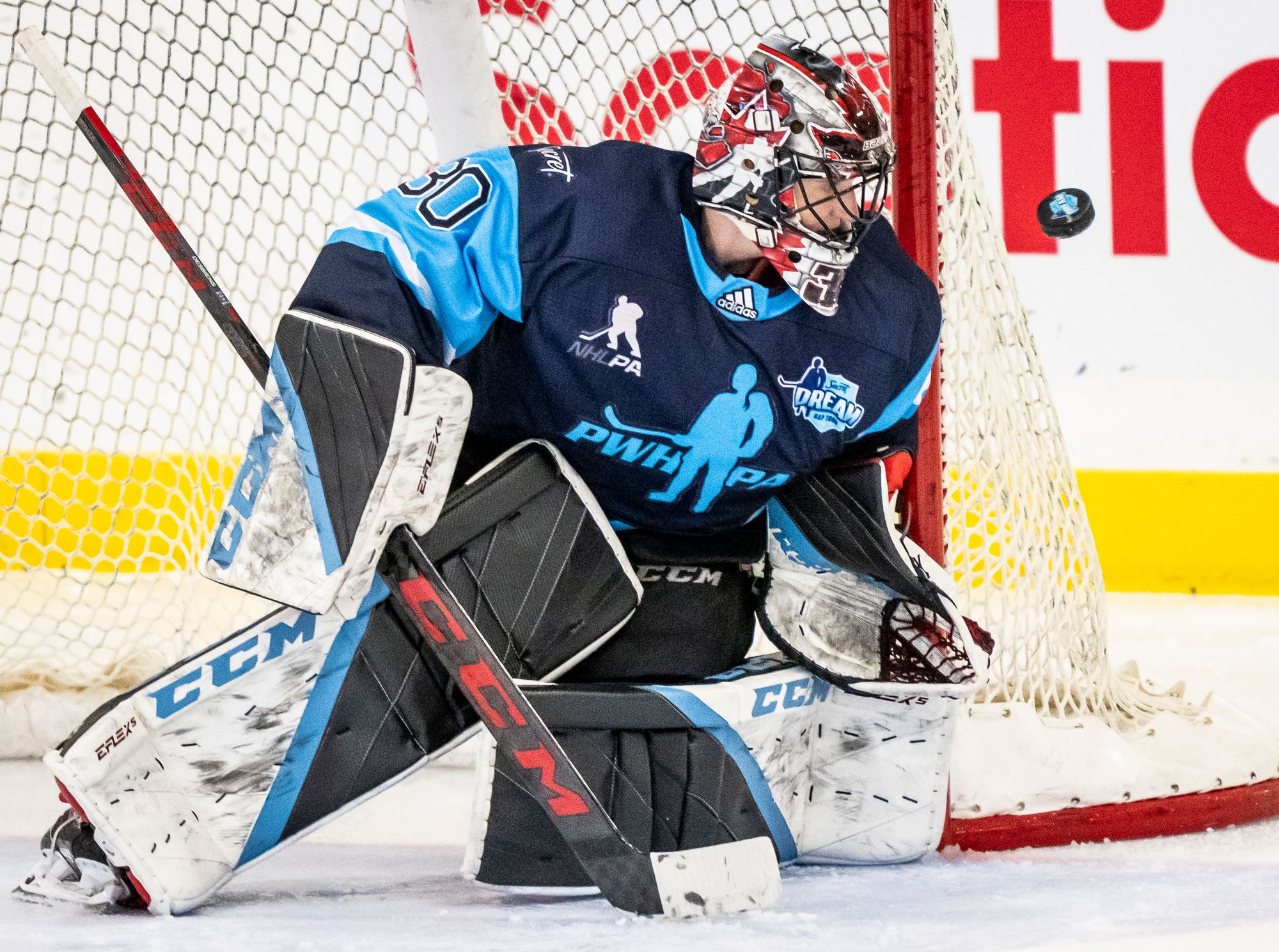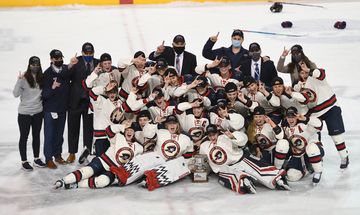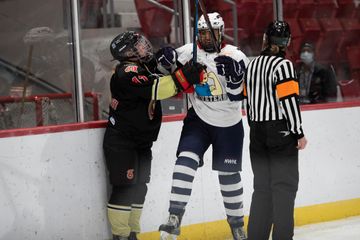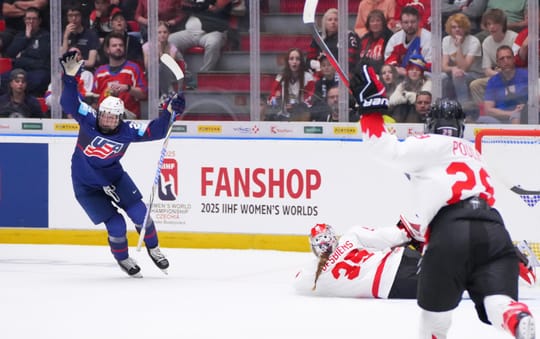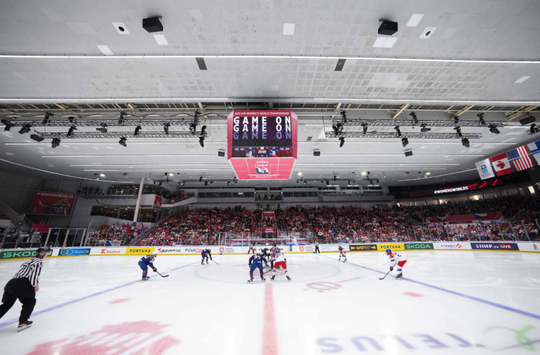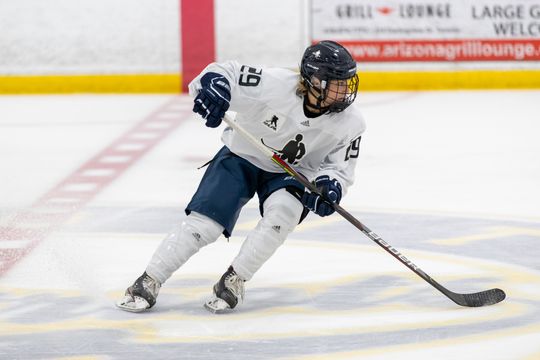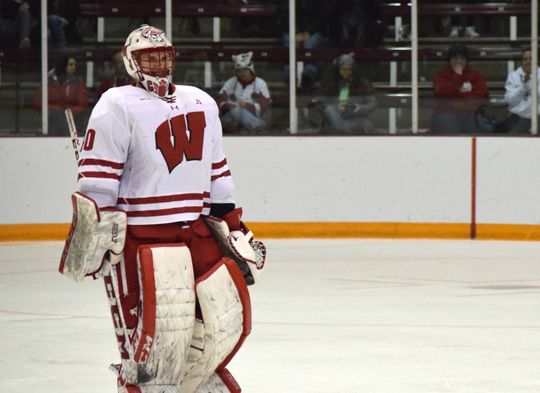When she returned to the University of Wisconsin to finish her master's degree in 2018, Ann-Renée Desbiens figured she was done playing hockey. At 24 years old and fresh off a silver medal at the Olympic Games, she simply wasn't enjoying it anymore, and the lack of suitable professional opportunities in the sport didn't provide any incentive to continue. With her NCAA eligibility exhausted, Desbiens was ready to move on and prioritize her off-ice career prospects. But as she hung up her pads to focus on her studies, she still wanted to give back to the program that had done so much for her. After discussions with team staff, the former Badgers star opted to rejoin the women's hockey team ― this time as a goalie coach.
Juggling her responsibilities with her classes, Desbiens attended practices twice a week and planned drills in her spare time. Among her pupils that year was Kristen Campbell, who she'll be suiting up alongside as part of Hockey Canada's centralization roster leading into the 2022 Olympics.
Desbiens didn't have many goalie coaches growing up; she was often left to her own devices to figure out what she needed to work on and put together drills to meet those needs. She took her experience as a player into building lesson plans as a coach, and in turn, coaching gave her a view from the other side.
"When you coach you realize that sometimes players do things that really are very annoying," she says with a laugh. "As a coach you would see it and you're like, Oh that's so frustrating, why are they doing that? And I realized that I was definitely one of those."
At the time, Desbiens had no intention of returning to the crease. After her season with Wisconsin she continued coaching through the summer, participating in an IIHF goalie camp and Hockey Canada's U22 camp. People kept asking if she would come back, and although she still wasn't quite convinced, she accepted the invitation to attend the 2019 Fall Festival. There, she performed well despite the limited training she'd put in to prepare. Most importantly, she had fun with it.
"I was kind of afraid I was going to have regrets if I didn't give it one more shot, to see if my experience could be different and if I still enjoyed it," she says. "With all the positive experiences I had with coaching, I wanted to see if it would be the same as a player."
Now preparing for her second Olympics, Desbiens credits the perspective she gained as a coach with increasing her self-awareness and pushing her to become a better teammate. Working with different goalies broadened her knowledge of the position and taught her to focus on the process. As a talented young player, Desbiens says she always had things pretty easy, both growing up in boys' leagues and beyond. Because of that, she could often get by on raw ability. "I wasn't a practice goalie," she admits; though she always turned up, she was only really in it for the games.
"Now I approach practice as a way to get better, and that's where you get the most shots," she explains. "I changed my mindset on that, and I think my teammates could say that now I give my 100% every practice while in the past it was very inconsistent. Some days I didn't really want to be there, so I wasn't trying really hard, and other days I was. So it was really difficult for my teammates and my team to see that up and down all the time."
Taking practice seriously has never been a struggle for Campbell, who's spent as much of the past six years working in the background as she has playing in games. As a freshman at the University of North Dakota, Campbell opted to redshirt in order to better adjust to the college level, which meant she had a full season devoted entirely to training.
"That year just honestly was incredible," she says. "I got to skate six, seven times a week and really push my body to its limit when I didn't need to be ready to play games on the weekend. Living that training schedule as a redshirt, I thrived in that environment. I just wanted to get better every single day."
It's an experience that prepared her tremendously well for this past year, when COVID-19 restrictions prevented competition. With only the occasional Hockey Canada camp scrimmages to physically prepare for, Campbell was able to devote the entire season to fine-tuning the technical aspects of her game. She and Hockey Canada goalie coach Brad Kirkwood zeroed in on small details like her ankle flexion and hand positioning in order to adjust her stance.
"Stance is so basic, but it's something that if you improve it, it can pay dividends to your whole game," she explains.
With the challenge of transitioning to a faster speed of play in the absence of game action, Campbell also spent a lot of time studying film. Even if she couldn't regularly test herself at that next level, she credits her off-ice work with improving her reads and preparing her to face international-calibre opponents.
"Work ethic is definitely what differentiates her the most," says Desbiens. "She's the type of player that's going to show up every day in practice. She's always willing to do extra ― she can do 10 sessions per week on the ice, she's totally fine with that. She's very disciplined."
Both as a redshirt and again as backup in her second year, Campbell learned to trust in her preparation, with the confidence that she'd be ready when her chance came. Upon transferring to Wisconsin after UND unceremoniously cut its women's hockey program, she finally got the opportunity to start. There, Campbell's constant desire to improve meant Desbiens was frequently on call for bonus work.
"Soupy is definitely on the overachieving side of things," Desbiens says with a laugh. "We would do video sessions together and she always had questions about so many things, so I was always there and available for her when she needed things. I brought some things on the ice, but I think I was probably more helpful to her off the ice."
As a full-time graduate student who herself had recently been in their shoes, Desbiens could relate to the Badgers' goalies and take a holistic view of the balance needed to juggle school, sports, and personal life. She also brought a different training approach than fellow volunteer goaltending coach Mark Greenhalgh, whose style both she and Campbell describe as decidedly old-school. Desbiens put an emphasis on game-like situations, which Campbell found particularly useful. But she also helped the 5-foot-9 netminder learn to use her size to her advantage in order to conserve energy.
Campbell credits her first goalie coach, Tyler Plante, with teaching her how to execute goaltending fundamentals, like the T-push and butterfly slide. She credits Desbiens for teaching her how to slide less.
"She's definitely more calm in net," says Desbiens of the key improvements that helped her former pupil land a spot on the national team. "I felt like when she came to Wisconsin, she felt the need to move quite a bit and was sliding into things. Now she's definitely more patient and lets the puck hit her and trusts her positioning way more."
For all her accomplishments with the Badgers ― Desbiens still owns several NCAA records, and backstopped a shut-out streak that included a 543:53 span without any goals allowed ― the one thing the 2017 Patty Kazmaier Memorial Award winner didn't earn as a player was a national championship. When Campbell blanked the rival Minnesota Gophers to capture the 2019 title, Desbiens finally got that missing piece.
"I was so excited," Desbiens says. "To see all the girls you've worked with all year do so well and finally win that championship for your school is very satisfying. You're just so excited for all those athletes that worked so hard. I didn't get to win it as a player, but it was probably as satisfying to win it as a coach. It kind of brought that unique experience that I was lacking the previous four years."
Campbell doesn't remember much of what happened after the final buzzer; she more or less blacked out after they won. But there's one moment that has stuck with her.
"[Desbiens] was running onto the ice when we won and she was just in full tears, she was so happy for everyone," Campbell recalls. "I'll never forget that."
When Desbiens returned to play in the fall of that year, Campbell was just integrating into the senior national team pool. Whereas a few months prior they'd been coach and student, the pair were suddenly peers and competitors within Team Canada. Desbiens recalls having to set boundaries early on: "The first camp when I came back after coaching her, she was asking me what could she do better and all that," she explains. "I was like, Soupy, right now I need to focus on me; there's goalie coaches there for that."
As time's gone on, Campbell's gotten used to being a teammate rather than a student, but as the youngest goalie of the group, it's taken the occasional reminder to see herself on equal footing.
"At January camp we were on the same team," she recalls, "And the goalie coach said to me, You're not looking up to her now ― you look her right in the eye."
"I always want to push myself to be the best I can be," Campbell continues. "So I want to be surrounded by the best goaltenders in the world, and she's one of the best goaltenders in the world. It's an environment that I crave. Even at the camps, competing against the older goalies, I want to go up against them because I want to get better myself, and then in return, push them as well to compete."
It's a dynamic that will continue to develop as Desbiens and Campbell prepare for the 2022 Beijing Olympics. Desbiens also has plenty of experience playing with Emerance Maschmeyer, who completes the trio for centralization. Having been through the process before, she underscores the importance of each goalie recognizing their own needs and respecting one another's boundaries.
"Any people that know Soupy and I would probably say that we're the exact opposite," Desbiens mentions. "She kind of wanted to live together for a period of time, and I was like, Soupy, I think we're going to kill each other! Probably me killing her if we lived together. It's just a little too much for me to handle — she's an awesome teammate, I love her and all that, but I definitely need my time and space, too."
It's that balancing act that will prove crucial as they work to make each other better while battling for a shared individual goal. And as the rookie of the bunch, Campbell is drawing on her varied past roles to prepare for whatever the season throws at her.
"Personally, I've kind of seen it all," she points out. "I've been the redshirt, I've been the backup goalie, the starting goalie. I've been in every situation, so that gives me a lot of confidence that no matter what comes my way, I'll be able to handle it.
"I think our goalie dynamic can be super strong," she adds. "We're all obviously very competitive and we all want to compete, and we all want to be the best that we can be. I'm excited to compete and push my goalie partners, but I'm also excited to learn from them. I think it's just going be incredible, being able to be in that environment for centralization and keep pushing towards our goal of winning that gold medal at the Olympics."
(Photo credit: Dave Holland/PWHPA)
